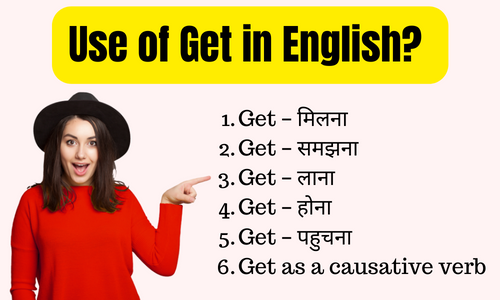Use of Get in English: The English language is full of versatile words, and “get” is definitely one of them in Spoken English. It is a word that has a wide range of meanings and uses. This comprehensive guide will help you master the usage of “get” in different contexts.
Definition and Explanation of “Get”
“Get” is a verb that can be used in various ways, such as to obtain, receive, become, or understand something. It is a common word used in everyday speech and writing.
Importance of Knowing How to Use “Get”
Having a good working knowledge of “get” is essential for effectively communicating in English. It is used in colloquial conversations, as well as in formal writing and business communication. Understanding how to use “get” can help you express yourself more clearly and precisely in any situation.
Overview of the Article
This article is divided into four parts, each covering different aspects of the usage of “get.” The first part will explain the basic uses of “get,” while the second part will describe more advanced uses. The third part highlights the variations of “get” used in different English regions, and the fourth part will offer tips on avoiding common mistakes when using “get.”
Part I: Basic Uses of “Get”
Section A: Everyday Meanings of “Get”
The most common uses of “get” are to indicate the act of obtaining something or someone, or the act of moving into or out of a place, as in the following examples

- “I need to get some groceries.”
- “Can you help me get my jacket?”
- “Let’s get out of here quickly.”
Section B: Idiomatic Uses of “Get”
“Get” is also used in many idiomatic expressions to indicate various states of understanding, such as:
- “I got to know my uncle’s family better over the holidays.”
- “After a few lessons, I finally got the hang of playing guitar.”
- “She needs to get a grip on her anger issues.”
Part II: Advanced Uses of “Get”
Section A Phrasal Verbs Using “Get”
Use of Get in English: “Get” is also often used as a base word for phrasal verbs. Phrasal verbs are used to describe a verb that has multiple parts, usually a transitive verb plus one or more particles.
Some popular phrasal verbs using “get” include:
- Get up
- Get over
- Get along
- Getaway
Differences between Phrasal Verbs Using “Get” and Other Verbs
Phrasal verbs using “get” offer a range of meanings when compared to other verbs. For example:
- “I need to get up early tomorrow.” versus “I need to awaken early tomorrow.”
- “She needs to get over her fear of spiders.” versus “She needs to overcome her fear of spiders.”
Section B: Colloquial Expressions with “Get”
“Get” is also commonly used in colloquial expressions that communicate certain attitudes or emotions, such as:
- “You’re really getting on my nerves.”
- “Let’s get the show on the road.”
- “We need to get cracking on this project.”
Part III: Variations of “Get” in Different English Regions
Section A: American English “Get” Variations
In American English, there exist many variations of “get” such as “gettin’,” “getcha,” and “gotta,” which are used in common speech and writing.
Read this also: although meaning in Hindi
Examples are:
- “I’m gettin’ ready to go out.”
- “Can I getcha a drink?”
- “I gotta run to the store.”
Section B: British English “Get” Variations
Similarly, in British English, “get” is also used in a variety of ways, such as “getting” and “gonna”. Examples include:
- “I’m getting’ pretty tired, to be honest.”
- “I’m gonna grab some lunch.”
Part IV: Common Mistakes and Tips on Using “Get”
Section A: Common Mistakes
Using “get” instead of “got” and using “get” instead of other verbs are common mistakes.
Examples of mistakes include:
- “I got to go to the store.” versus “I have to go to the store.”
- “She got sold her phone.” versus “She sold her phone.”
Section B: Tips on Using “Get”
To use “get” effectively:
- Use “get” sparingly.
- Context is everything.
Exploring the Versatile Verb “Get” in English
The English language stands out for its expansive vocabulary and the adaptability of its words. One such word that holds a prominent place in the English lexicon is “get.” Let’s delve into the various meanings and usages of “get” in English.
Understanding the Meaning of “Get”
At its core, “get” is a verb that encompasses a broad spectrum of meanings and actions. Its versatility often results in diverse interpretations and applications in both spoken and written English.
Usage of “Get” in English: A Comprehensive Overview
- Obtaining or Receiving:
- One of the most frequently encountered applications of “get” is to express the act of obtaining or receiving something. For instance, “I will get a cup of coffee” or “She got a gift for her birthday.”
- Becoming or Acquiring:
- “Get” can also convey the process of becoming or acquiring something. For example, “He got tired after the long walk” or “She got a new job.”
- Arriving or Reaching:
- It can signify reaching a destination or arriving at a specific place. “I will get to the airport by 5 PM.”
- Understanding or Perceiving:
- In informal conversations, “get” is often used to express understanding or grasping a concept. For instance, “I finally get the math problem” implies understanding it.
- Fetching or Retrieving:
- “Get” is apt for indicating the act of fetching or retrieving something. You might say, “Could you get my book from the shelf, please?”
- Denoting Possession or Ownership:
- In contexts related to ownership, “get” can signify obtaining possession. For instance, “She got a new car” implies that she now owns the car.
Tips for Using “Get” in English: Examples and Guidance
Mastering the appropriate use of “get” in English may pose a challenge, but practice is the key to proficiency. Here are some valuable tips and illustrative examples:
- Employ “get” when referring to actions involving obtaining, receiving, or acquiring something.
- In situations involving comprehension or perception, consider using “get” as a versatile alternative to words like “understand” or “comprehend.”
- In informal dialogues, embrace the versatility of “get,” allowing it to seamlessly convey a multitude of meanings.
Conclusion
Effective communication in English requires a solid grasp of the verb “get.” This guide has outlined its various uses and how to avoid common mistakes. Remember that “get” is a versatile verb that can help you communicate more effectively in any situation, so long as you use it judiciously.
FAQs
Q: What’s the difference between “get” and “got”?
“Get” is the present tense of the verb, while “got” is the past tense singular form. An example of “get” in a sentence is “I get to the office at 9 am,” while an example of “got” is “I got a new job last week.”
Q: Can “get” be used in formal writing?
While “get” is commonly used in everyday speech and informal conversations, it should be used sparingly and replaced by more precise verbs in formal writing.
Q: How do I know which phrasal verb to use with “get”?
The choice of the phrasal verb usually depends on the context of the sentence.
Q: Can I also use “got” with phrasal verbs using “get”?
In general, “got” can replace “get” in some phrasal verbs if in the past participle form.
Q: Why is “get” so commonly used in English?
“Get” is a versatile verb that can be used in a wide range of meanings and situations, making it a popular and useful choice in English.



